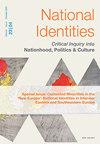Violent conflict and National identity among the Pakistani Pukhtuns (Pashtuns) in Swat Pakistan: A theoretical and empirical exploration
IF 0.7
Q3 POLITICAL SCIENCE
引用次数: 0
Abstract
ABSTRACT Using an extended constructivist position and the case study of Pukhtuns in Swat, Pakistan, this study outlines the interplay between violent conflict (between Muslim Militants and Pakistani state military) and National identity and its markers. The conflict is peculiar; (1) because of the use of Islam by Muslim militants which is an identity marker for Pakistani national identity and Pukhtun ethnic identity, (2) the case of Swat, an ex-princely state integrated only in 1969 in Pakistan with a history of religious violent mobilizations. Further, as Pakistani state has been facing problems with the process of national integration of its multiple ethnicities, the case of national identity becomes significant to be explored The study argues that the impacts of conflict and violence on national identity are complex and multi-dimensional. National identity is neither lost nor reaffirmed, yet as a result of the violent conflict. The article explores the impacts of violent conflict for religion (Islam), State institutions (military), discourses (of pride, sacrifice, and complains) and national symbols (holidays) as markers of National Identity in Pakistan through a fieldwork in Swat from November 2016 to May 2017 and later in November 2021.巴基斯坦斯瓦特地区巴基斯坦普什图人的暴力冲突与民族认同:理论与实证探索
本研究采用扩展的建构主义立场和对巴基斯坦斯瓦特普赫图人的案例研究,概述了暴力冲突(穆斯林武装分子与巴基斯坦国家军队之间)与国家认同及其标志之间的相互作用。这种冲突是特殊的;(1)因为穆斯林武装分子使用伊斯兰教,这是巴基斯坦民族认同和普赫图族认同的身份标志;(2)斯瓦特的情况下,一个前王侯州,直到1969年才与巴基斯坦合并,历史上有宗教暴力动员。此外,由于巴基斯坦国家在其多种族的国家整合过程中一直面临着问题,因此国家认同的案例具有重要的探索意义。研究认为,冲突和暴力对国家认同的影响是复杂的、多维的。民族特性既没有丧失,也没有得到重申,但这是暴力冲突的结果。本文通过2016年11月至2017年5月和2021年11月在斯瓦特的实地调查,探讨了暴力冲突对宗教(伊斯兰教)、国家机构(军事)、话语(骄傲、牺牲和抱怨)和国家象征(节日)作为巴基斯坦国家认同标志的影响。
本文章由计算机程序翻译,如有差异,请以英文原文为准。
求助全文
约1分钟内获得全文
求助全文
来源期刊

NATIONAL IDENTITIES
POLITICAL SCIENCE-
CiteScore
1.70
自引率
0.00%
发文量
37
期刊介绍:
National Identities explores the formation and expression of national identity from antiquity to the present day. It examines the role in forging identity of cultural (language, architecture, music, gender, religion, the media, sport, encounters with "the other" etc.) and political (state forms, wars, boundaries) factors, by examining how these have been shaped and changed over time. The historical significance of "nation"in political and cultural terms is considered in relationship to other important and in some cases countervailing forms of identity such as religion, region, tribe or class. The focus is on identity, rather than on contingent political forms that may express it. The journal is not prescriptive or proscriptive in its approach.
 求助内容:
求助内容: 应助结果提醒方式:
应助结果提醒方式:


